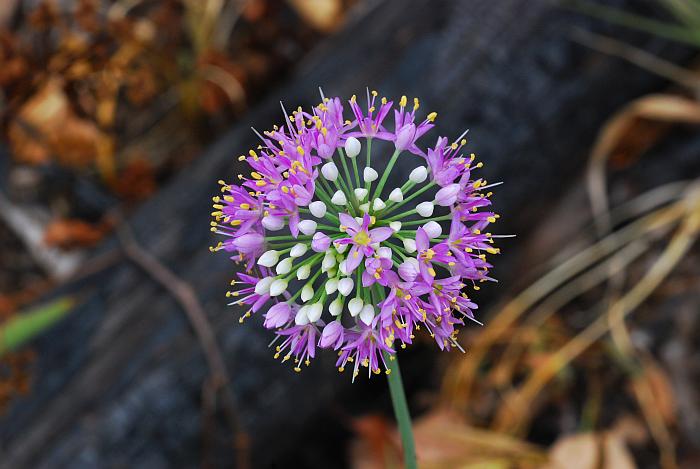Allium stellatum Nutt. ex Ker Gawl.
Wild Onion

Native
CC = 6
CW = 5
MOC = 41
© SRTurner
Allium stellatum Nutt. ex Ker Gawl.Wild Onion | |
 |
Native CC = 6 CW = 5 MOC = 41 |
© SRTurner |
|
Family - Liliaceae Habit - Perennial forb from a bulb.
Stems - Bulbs to 4 cm, with a papery outer coating and slightly thickened roots. Aerial stems to 60 cm tall, erect, terete, glabrous, sometimes glaucous, bent at the apex when immature, becoming erect with age, green.
Leaves - Basal or nearly so, to 40 cm long, 5 mm broad or less, flattened, linear, present during anthesis, light green.
Inflorescence - Terminal umbel with numerous flowers, nodding when immature. Bulblets absent. Pedicels much longer than the flowers, glabrous, purplish in strong sun, to 2 cm long.
Flowers - Perianth pink, widely spreading, 6-parted, the tepals to 7 mm long, elliptic, typically acute at the apex, glabrous. Stamens 6, erect, exserted beyond the perianth parts. Filaments terete, pink, glabrous. Anthers yellow when fresh, quickly becoming brown. Style pink, terete, glabrous, shorter than or equaling the stamens.
Fruits - Capsules 3-5 mm long, obovoid, 3-lobed, each lobe with a pair of hornlike, triangular projections near the top. Seeds black.
Flowering - July - November. Habitat - Glades, bluffs, open dry woods, roadsides. Origin - Native to the U.S. Lookalikes - A. cernuum. Other info. - This showy species is reasonably common in Missouri glades south of the Missouri River. Beyond Missouri its range within the U.S. occupies two curiously disjunct regions, one centered around southwestern Missouri and the other in Minnesota and the Dakotas. It is the latest blooming onion in Missouri and is easily identified in the field. The papery-covered bulb, pink flowers, and flat, persistent leaves are good characters to look for. Note that A. stellatum can sometimes be confused with the closely related A. cernuum Roth, which looks similar. The latter species has nodding inflorescences (cernuum means "nodding"), but A. stellatum also does this when not fully mature. The inflorescence of A. stellatum becomes erect with time. A more reliable difference between the two plants is the flower shape. The floral perianths of A. stellatum are spreading and open, whereas those of A. cernuum are campanulate (bell-shaped). Photographs taken in Eminence, MO., 9-21-03 (DETenaglia); also at Shaw Nature Reserve, Franklin County, MO, 8-19-2007 and 9/25/2009; Taum Sauk State Park, Iron County, MO, 7-18-2011; Victoria Glade, Jefferson County, MO, 9-7-2014, Don Robinson State Park, Jefferson County, MO, 9-16-2021, and St. Joe State Park, St. Francois County, MO, 7-11-2025 (SRTurner). |